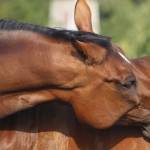Intestinal Inflammation in Horses: Causes Investigated

The sensitive nature of the horse’s intestinal tract defies dispute. The causes of fatal intestinal inflammation, however, are subject to question. Researchers recently set out to determine the incidence and underlying cause of these inflammatory lesions in a retrospective study of cases that spanned nearly 25 years.*
Using veterinary records from 1990 to 2013, researchers identified 710 horses with inflammatory intestinal lesions and sorted them into the following 11 groups:
- Colitis: inflammation of the lining of the colon
- Duodenitis: inflammation of the duodenum, of the first segment of the small intestine, closest to the stomach
- Enteritis: inflammation of the intestine, especially the small intestine, usually accompanied by diarrhea
- Enterocolitis: inflammation of both the small intestine and the colon
- Enteropathy: any disease of the intestine, especially the small intestine
- Enterotyphlitis: inflammation of the small intestine and cecum
- Gastritis: inflammation of the stomach
- Ileitis: inflammation of the ileum, or the third segment of the small intestine, closest to the cecum
- Jejunitis: inflammation of the jejunum, or the second segment of the small intestine, located between the duodenum and the ileum
- Typhlitis: inflammation of the cecum
- Typhlocolitis: inflammation of the cecum and colon
Review of the records revealed that colitis was the most common fatal intestinal inflammatory lesion documented in this set of 710 horses, with 323 dying from the disease. Enteritis (146) and typhlocolitis (138) also ranked high among deaths.
Isolating the exact cause of the inflammation proved difficult, as 465 of the 710 cases were classified as undetermined. Bacterial infiltration was found in 167 cases, with Clostridium spp. and Salmonella spp. identified as the most prevalent bacteria.
Gastrointestinal health is a priority among horse owners, according to Catherine Whitehouse, M.S., a nutrition advisor for Kentucky Equine Research.
“Gastrointestinal well-being is unquestionably a concern for many horse owners. Providing a nutritionally balanced diet and implementing sound feeding strategies are core responsibilities,” she said, “but some horses require additional support for optimal digestive function. This includes offering research-proven supplements that address stomach and hindgut health.”
*Macias-Rioseco, M, A.E. Hill, and F.A. Uzal. 2020. Fatal intestinal inflammatory lesions in equids in California: 710 cases (1990-2013). Journal of the American Veterinary Association 256:455-462.








